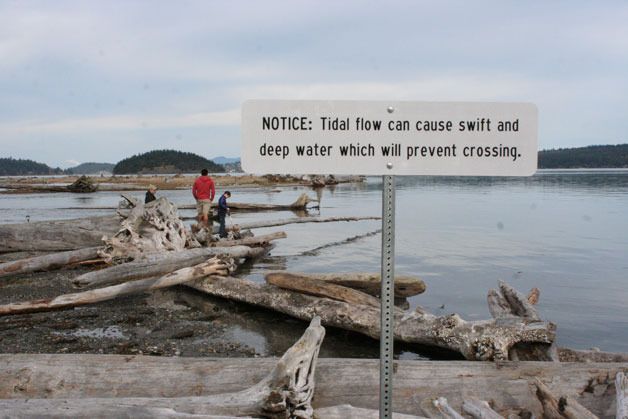Roger Baker’s biggest fear lately is coming home to find a drowning victim washed up in his backyard.
“When we’re headed home my wife says, ‘I hope there’s nobody down there,’” Baker said.
Within just the past two months, two fishermen, in separate incidents, were swept away by the current at Ala Spit Park and pulled into the cold and dangerous waters.
Both men were wearing fishing waders that acted like anchors, causing them to sink.
THE BACK deck of Baker’s home looks out over Ala Spit Park in Skagit Bay. Baker said he has learned to keep an eye out for the residents and fishermen who venture out there.
Ala Spit is a county park on North Whidbey popular with nature walkers and fishermen alike.
In 2011, the county removed 800 feet of rock and crushed concrete from a center portion of the spit in order to restore the area to its natural state.
The intent was to repair salmon habitat made vulnerable by erosion caused by the barrier.
However, the removal of the bridge-like rocks has made the spit dangerous to traverse at high tide.
Over the past year, Baker said he watched that portion of the spit erode below even low-tide water levels in places.
ISLAND COUNTY Sheriff’s Deputy Robert Davison responded to both close calls.
Davison said he was surprised that the two men survived.
Davison, who served in the Navy as a helicopter rescue swimmer, is familiar with the surprising strength of tidal flow.
“It’s very deceptive when the tides come in but people think they can wade across, but the current pulls them out,” Davison said.
Ala Spit has water speeds up to 12 knots and has always been a problem area, said Davison.
THE DANGER at Ala Spit seems to be increasing in recent years, Davison said, and compared it to fast currents at Deception Pass.
Davison said the water in Puget Sound stays at about 50 degrees year round, giving people roughly 15 minutes before hypothermia begins to set in.
“The only reason (the two fishermen) got to the shore was because they were fit,” Davison said. “It’s incredible they didn’t just have someone wash up the next day.”
“It’s gonna be tragic.”
To stay safe in the area, visitors must be diligent and pay attention, Davison said.
ON SEPT. 22, Baker said he received a call from his wife telling him that there was a man in the water.
The man, from Bellevue, had attempted wade to the other side of the spit while the tide was coming in. Baker said the man stepped into a deep spot, lost his footing, and was swept toward the bay.
The fisherman’s waders filled with water, making it difficult to swim.
However, the man, who appeared to be in his 40s, was able to make it to the shore of Baker’s property.
By the time Baker and his wife got to him he was in the water about 20 minutes and couldn’t stand because of apparent hypothermia.
IN ADDITION TO Davison, paramedics arrived to treat the man, who opted not to be hospitalized. Baker and his wife “warmed him up,” lent him a shirt and jeans, and he was able to drive himself home three hours later.
A near identical accident occurred on Nov. 8 when another man, in his 20s, attempted a similar crossing, and Baker spotted him.
Again, the fisherman was able to swim to the shore, but experienced the same immobility and hypothermia.
That fisherman also refused hospitalization, was given clothes and drove himself home.
“If we hadn’t been there he would have still been in the water and probably would be dead,” Baker said.
“This is a common thing now.”
BAKER ALSO recounted an incident in August in which a woman and her two small sons were trapped at the tip of the spit and were intending to wait for the tide to go back out. That would have kept them stranded until midnight.
Baker said he took his boat out and gave them a ride to the parking lot.
Though there is a lull right now in the fishing calendar, Baker said he is fearful that more accidents will occur when steelhead fishing begins in December.
WHILE THE county signed an agreement in July with Coastal Geological Services to complete a feasibility study for the area, no progress has been made and no deadlines have been set to address the park, said Jill Wood, environmental health director for Island County Public Health.
Asked if the near-drownings might expedite the process, Wood said that is a “political issue” left to elected officials.
Baker said he hopes people stay cognizant of the tide patterns and not go out to the end if the tide is on its way in. He hopes his message will save lives in the long run.
“Maybe we will help somebody,” Baker said.
“I’m running out of jeans.”



